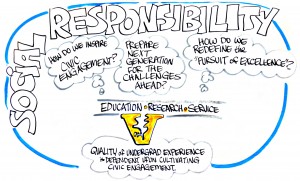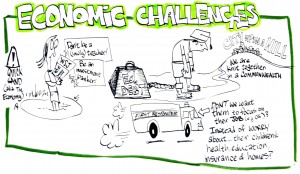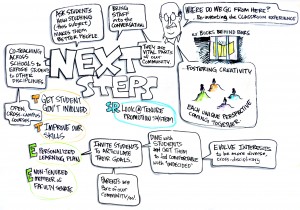The Future of Teaching – A Report from the CFT’s 25th Anniversary Symposium
by Derek Bruff, CFT Acting Director
Earlier this week, I blogged about one of the two public events the CFT hosted as part of our 25th anniversary celebration, a keynote on deep learning by CFT founding director Ken Bain. Our other big anniversary event last week was a symposium on the future of teaching and learning. The symposium, held Friday from 9 to 1 at the Commons Center, provided faculty, students, and staff from all around Vanderbilt the chance to engage in a discussion about teaching that was both global and forward-looking in nature. Participation at the symposium was fantastic, with very engaged participants from all four undergraduate colleges, as well as the Schools of Nursing and Medicine, the Commons, and the Dean of Students office.
The symposium’s opening session featured remarks by three faculty panelists on the themes we had selected for the day: changing technologies, the university’s social responsibilities, and economic challenges.
- Cynthia Paschal (Associate Professor of Biomedical Engineering and Associate Dean in the School of Engineering) noted many of the ways that educational technology has changed since she started teaching at Vanderbilt and posed a number of questions about how technology affects teaching.
- Marshall Eakin (Professor of History and Faculty Director of the Ingram Scholars Program) reminded us of the university’s service mission, noting that the critical question is not whether, but how to prepare students to address critical social issues.
- Cecelia Tichi (William R. Kenan, Jr., Professor of English) noticed about ten years ago students bringing copies of the Wall Street Journal to class, a sign that they were choosing careers in investment banking over service work. She asked us to consider how we might help students focused on careers (or getting out of college debt) to understand their privileged role in the “commonwealth.”
Peter Durand and his colleagues at Alphachimp Studios were our graphic note-takers during the opening session and subsequent sessions. Their visual notes provide a useful capture of the day’s discussion. You can see them embedded in this blog post. (Click on an image to see a larger version.) And you can read their thoughts on the event over on the Alphachimp blog.
After the opening remarks, symposium participants moved to three breakout discussions, one for each of the symposium’s themes. Discussions during these breakout sessions first focused on exploring ways these themes play out at Vanderbilt currently, then moved on to brainstorming ways that we as individuals and as an institution might respond to these teaching challenges. Look for more posts here on the CFT blog in the coming days sharing aspects of these breakout discussions.
For the final hour of the symposium, we gathered together again to share observations and ideas from the breakout sessions, starting with comments by our faculty panelists, as well as Ken Bain. Here are a few highlights:
- Cynthia Pascal noted that the technology we use reflects the values we have, and that, since Vanderbilt values community, our technology use should help build our community. Cynthia also conveyed one of the key points from the technology breakout, that faculty need good technical support when adopting and using educational technology.
- Marshall Eakin pointed to the role of Vanderbilt’s tenure, promotion, and reappointment process in shaping the ways that instructors teach. For instructors to prepare students to address critical social issues, instructors will need to be rewarded for doing so.
- Cecelia Tichi shared the suggestion of having students design “personal contracts” that would detail personal and professional goals and plans for meeting those goals. One student chimed in at this point to say that he often advises his peers to consider not just their academic GPAs, but their “life GPAs” when planning their futures.
- Ken Bain urged us to consider ways to reinvent the classroom experience, using the credit-bearing course as a way to foster creativity, create community, and help students connect their learning with their personal and professional lives.
Symposium participants suggested a number of ways that the Vanderbilt teaching community might address the challenges surfaced during the day. Several of these are captured in Peter Durand’s visual notes below.
At the CFT, we’re already busy planning future conversations and projects as follow-ups to the symposium. If you have suggestions for next steps or would just like to be involved, please let us know!







Leave a Response